The One Food to Eat Right Now to Immediately Be Healthier

Feel like your diet is in a rut? Or are you looking to breathe a little extra life into your healthy-ish diet? You're not alone. Whether you've noticed that you've fallen into unhealthy eating patterns recently (many of us have) or if you want to give your diet a bit of a refresh, there is an easy way to do that—and it doesn't require overhauling your entire pantry. On the contrary, according to Lauren Manaker MS, RDN, LD, founder of Nutrition Now Counseling and author of Fueling Male Fertility, you can start with one step to immediately set your diet on the right path to being healthier: adding salmon to your fridge.
The health benefits of salmon are plentiful.
"Salmon is chock-full of key nutrients to support overall health, including selenium, potassium, and vitamin B6. Plus, it is a source of high-quality protein that helps make any meal more satisfying," she says.
All of these benefits are great, but you may be wondering why we're calling salmon out, in particular, as a food that can immediately improve your diet. There are so many superfoods with incredible health benefits, right? Right. But the thing that stands out with salmon is its omega-3 fatty acid content.
Why the omega-3 fatty acid content of salmon makes it a food that can help you immediately be healthier.
Omega-3 fatty acids are a type of polyunsaturated fat that is considered "essential." What this means is that our bodies can't make this nutrient—we can only get it from food, and salmon is one of those foods. In fact, it's one of the best sources of omega-3s, containing the second-highest amount of these fatty acids out of all the fish in the sea.
"Salmon is known for being a rich source of the omega-3 fatty acids DHA and EPA. Having adequate levels of these fatty acids [in your diet] is linked to a slew of health benefits, including a reduced risk of early death," says Manaker.
While omega-3s are an essential, healthy part of a balanced diet, there's an even more important reason why we recommend eating this fish: the majority of people are not eating nearly enough omega-3s, so adding salmon to your diet can immediately start repopulating your body with the fatty acids you need.
"Most Americans don't get enough of these key fatty acids in their diet, which is concerning from a health perspective. Adding salmon to your diet is one easy way to bump up your DHA and EPA intake with little effort," says Manaker.
Why we need to be eating more salmon and other omega-3-rich foods.
Humans evolved on a diet with a ratio of omega-6 fatty acids to omega-3 fatty acids of 1:1; however, that ratio is now closer to 15:1. Like omega-3s, omega-6s are also essential, but they are also pro-inflammatory. As such, studies show that eating too much of them, as we do in Western diets, can lead to an increased risk of many diseases, including cardiovascular disease, cancer, inflammatory and autoimmune diseases, and obesity, according to a study published in Nutrients.
There are a few reasons why our omega-6 to omega-3 ratio is so much higher than it once was. One of which is that since the dawn of modern agriculture, there has been a noticeable decrease in omega-3 content of foods that traditionally contain high levels of omega-3s, including in fish, animal meat, and eggs. But more importantly, our intake of omega-3-rich foods has decreased significantly.
While we eat fewer omega-3 foods, we're also eating more omega-6 fatty acids than we traditionally have. This is in due part to the prevalence of soybean oil—a vegetable oil high in omega-6s—in our diets. Soybean oil is the component in the American diet that has increased the most in the last 100 years, constituting over 60% of all edible vegetable oil consumption in the U.S. It's commonly found in countless processed foods and fried foods, according to a study published in Scientific Reports.
While you can decrease your omega-6 intake by reducing your intake of certain omega-6-rich foods like soybean oil, it's also, if not more, important to focus on increasing your omega-3 intake. That's especially the case since, as mentioned earlier, omega-6s are still essential fats, and they do have health benefits when they're eaten in moderation. Plus, replacing less healthy saturated fats with any polyunsaturated fat—even omega-6s—is good for you.
Conclusion
In summary, by eating more salmon, you'll reap its nutritional benefits of micronutrients, such as vitamin D and B12, and quality protein. But perhaps best of all, you'll increase your intake of anti-inflammatory, heart-healthy omega-3 fatty acids.
To reap the benefits, the FDA recommends eating 2 to 3 servings of fish, or about 8 to 12 ounces, per week. While we recommend salmon because it's widely available and one of the more popular fish, experts recommend eating a variety of fish as each has its own nutrient profile. So start with salmon, and then add more fish types like tuna, mackerel, cod, and flounder! Read more: Surprising Side Effects of Eating Fish, According to Science.
For more healthy eating news, make sure to sign up for our newsletter!








